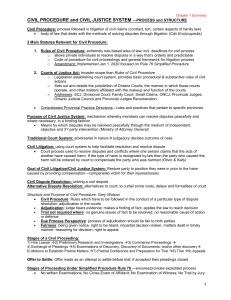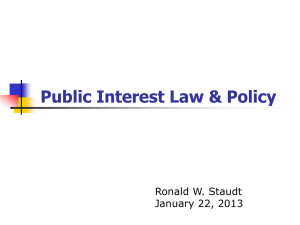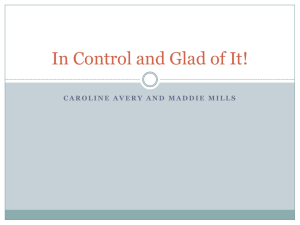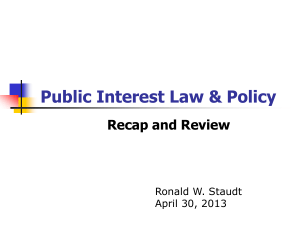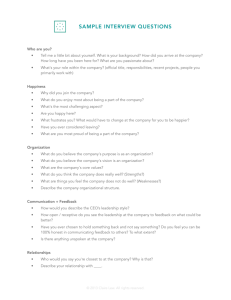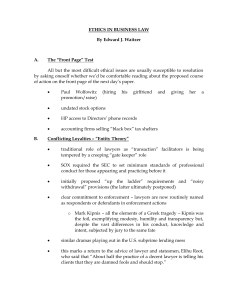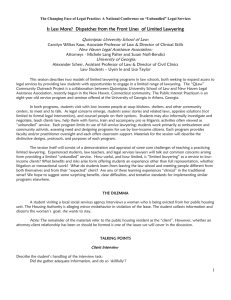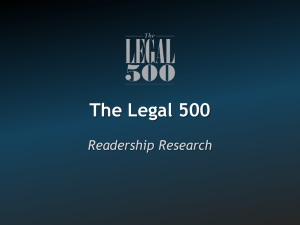Lawyering in 21st Century
advertisement
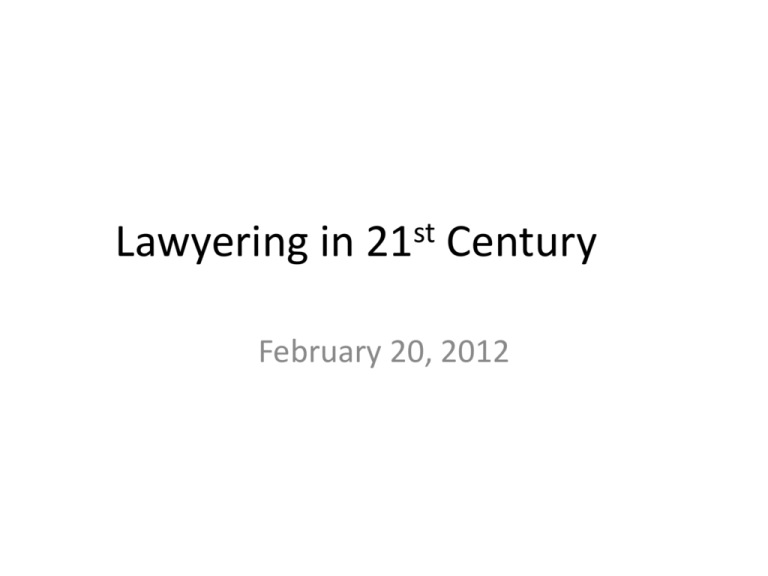
Lawyering in st 21 Century February 20, 2012 Clicker Questions • Feedback: Research sessions with Fox, Wegemer & Maute – Format dual “dog & pony show” Worked? (y/n) – Prefer solo (Fox only, Wegemer only)? (y/n) – Likes – Constructive “wish list” for future presentations • Feedback on Hendryx – Likes – Constructive “wish list” for future presentation Clicker Questions • Should I pursue having Mr. Stephen Denyer speak via technology? (English solicitor practicing in Germany with huge firm, CCBE representative) (y/n) • If so, willing to make adjustment in meeting time or day? (y/n) • If so, available at noon (state preference) a. Mon. March 12? b. Tues., March 13? c. Mon. March 26 The Happy Lawyer . . . Work, Life & Ethics, Keeping Everything in Balance CLICKERS • Is this “impossible dream” …. Quixotic?(Y/N) • Are you stressed, burned-out, depressed now? (yes/no) • If so, can you reasonably expect it to get any better after graduation? (yes/no) Identify concrete things you can do NOW to improve your happiness, for now & future Self-care Nutrition Exercise People who care & affirm you (law & non-law) R & R that rejuvenates (vs. that which is temporary but maybe unsatisfying or unhealthy) THE HAPPY LAWYER: Random Facts Making a Good Life in the Law By Nancy Levit and Douglas O. Linder (Oxford University Press, 2010) Graduates of “fourth-tier” law schools are happier with practice, on average, than are graduates of “first-tier” law schools. Roughly half of happiness is determined by genetics. Exercise modifies pathways in the brain to make them better equipped to handle stress. Over half of lawyers are “very satisfied” with their careers, making lawyers happier than most workers in 198 surveyed jobs, in between slightly happier physicians and slightly less happy accountants. Work spaces with high ceilings promote expansive thinking while work places with lower ceilings are better for detail work. Female lawyers and male lawyers are about equally happy with their careers, but women complain more about lack of “worklife balance”. Lawyers are more likely to be “big picture” thinkers, pessimistic, and introverted than are most non-lawyers. The intellectual challenge of law best matches lawyers expectations as they entered practice; “ability to contribute to the public good” falls most short of expectations. • When a person has important goals, and is failing to make adequate progress toward them, this too can lead to life dissatisfaction. • Personal satisfaction with the self, religious or spiritual life, learning and growth, and leisure Other sources of happiness • When these sources of personal worth are frustrated, they can be powerful sources of dissatisfaction. • There are additional sources of satisfaction and dissatisfaction – some that are common to most people such as health -and others that are unique to the individual. Relevance to Law of Lawyering? 83 OBJ (2/18/12) 419 Scheduled meetings 423-25 State of Oklahoma ex rel Oklahoma Bar Ass’n v. Dane Wilson (Order approving resignation pending discipline, with dissent) 425 State of Oklahoma ex rel Oklahoma Bar Ass’n v. Amy Lynn McTeer (Order of Immediate Interim Suspension) Relevance to Law of Lawyering? Pdf, ORPC 1.1, 1.3 cmt. 2 1.16(a)(2) 8.3(a) duty to report another’s violation of RPC re “substantial question as to . . . honesty, trustworthiness or fitness as a lawyer in other respects. . .” (d) LHL, Ethics Counsel, MAP exception 8.4(a), (b), (c), (d), (e), (f)!!!! Relevance to Law of Lawyering? OBA v. Schraeder (Okla. 2002)(starting p. 5 in pdf) *** Among first U.S. jurisdictions to recognize “occupational burnout” as mitigating factor to be considered in evaluating appropriate sanction to protect public interest, after finding disciplinable misconduct. Pdf at pp. 10-13. Corrective action upon realizing problems, reduced sanction to 30 day suspension. Relevance to Law of Lawyering? OBA v. Smith, (1/31/11), pdf pp. 14-20 Contrast to Schraeder: She did everything right, after terrible legal violation. (self-report to OBA and employer, promptly entered treatment, continued cooperation with all, resulting in supportive testimony.) Sanction: public censure, 1 year deferred suspension, subject to compliance with probationary conditions. Relevance to Law of Lawyering? Price of “success”? Angel, Burnout Pandemic: Accommodating Workaholism in the Practice of Law Workaholic behaviors * working long hours * withdrawing from healthy interpersonal relationships with family & friends * obsessive compulsiveness/perfectionism * competitiveness * conflict Ways to Become a Happier Lawyer 1. Make sure your job is one that matters to you. • choose meaningful projects over busy work • try to become a key player in your firm and legal community 2. Think about the way your job positively affects other people. • identify how your work has bettered lives 3. Strive for a comfortable work-life balance. • be willing to sacrifice income if necessary (it won’t matter) • consider telecommuting or “5 days work in 4” options • discuss work flexibility with sympathetic partners 4. Work to make your job more secure. • know and become friends with those who control your fate • meet or exceed firm expectations • develop expertise in noncyclical or countercyclical areas 5. Take control of your work product and work space. • set, when possible, a timetable for finishing work • develop your own strategy for meeting goals 6. Connect with people. • work on collaborative projects when possible • eat lunch with colleagues or clients • participate in firm social events • seek help and offer feedback • praise colleagues who do good work • remember birthdays and write personal notes • choose face-to-face work when possible 7. If happiness seems possible in your job, commit to that job. • don’t always look for greener grass (water your own) • remind yourself what you really like about your job • trust those who earn it and remember that building trust takes lots of interaction • personalize your work space with photos, art, etc. 8. Increase the frequency of your “flow experiences”. • think about projects that have “made time fly” • identify common characteristics of those projects • look for tasks that challenge you but are within your abilities • avoid, when possible, tasks that are so easy as to bore you • find a work setting where distractions are minimized • try to include a variety of tasks within your work day • work in places with natural light and views of nature 11. Know your strengths and what gives you pleasure. • identify tasks and events that give you pleasure, and do them more often • recognize your strengths and find ways to use them 12. Align your work with your values. • identify your values and look for work consistent with those values • consider volunteering for pro bono work or work that you care about

